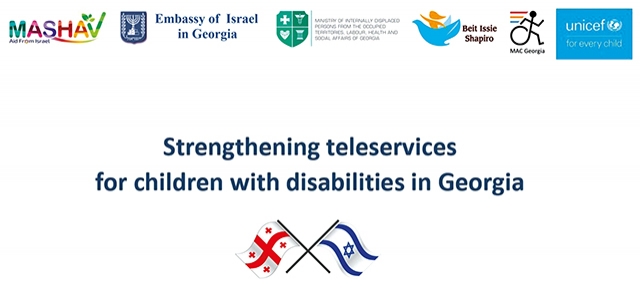UNICEF-Israel-Georgia Cooperation: Strengthening Teleservices for Children with Disabilities in Georgia
The COVID-19 outbreak in Georgia has created additional challenges for children with disabilities and their families. Due to the nationwide state of emergency, social services, such as early intervention, day care, home-based care, and rehabilitation/habilitation were suspended at the beginning of March. More than 4,000 children with disabilities/developmental delays were left without state social services.
In a project initiated by the Georgian Ministry of IDPs from the Occupied Territories, Labor, Health, and Social Affairs (MoIDPOTLHSA), conceived by UNICEF Georgia and MAC (McLain Association for Children) Georgia, and supported by the Embassy of Israel & MASHAV (Israel’s International Development Cooperation Agency), the teleservices provided to children with disabilities in Georgia are to be improved and upgraded.
Beit Issie Shapiro, an Israeli organization considered to be a global leader in the field of treating children with disabilities, was chosen by UNICEF Georgia as an expert consultant on this project. Beit Issie Shapiro’s vast experience and unique expertise will serve to devise both short and long-term strategies for the provision of advanced, sophisticated teleservices to Georgian children & families.
How it came about
In April, MoIDPOTLHSA approached UNICEF Georgia with a request to assist service providers in modifying the services and continue support to children and their families. UNICEF Georgia, in close cooperation with MAC Georgia, started to support service providers to switch to online service provision. For three months, the local experts of MAC Georgia conducted group and individual sessions to help various service providers to successfully adjust to distance service provision. Additionally, MAC Georgia developed a Facebook platform that gave parents an opportunity to access timely COVID-related information and guidance on how to help and stimulate their children during quarantine.
In July, the majority of providers resumed the provision of direct services. However, to meet the second expected wave of COVID-19 more prepared, the ministry plans to strengthen and standardize the teleservices. This plan includes the development of a conceptual framework for the provision of teleservice, principles and methodology, funding modality and monitoring indicators. Besides the short-term plan, the ministry intends to develop the concept of hybrid services, merging direct and teleservices. The hybrid services will be beneficial in the long run for those children and families who, due to certain conditions, cannot travel to the service centers frequently. Accommodation of the short- and long-term service needs of children with disabilities requires comprehensive enhancement of teleservices. Hence, it is pivotal to analyze the local and international experience related to teleservices, conceptualize the remote service provision for children with disabilities, its methodology, monitoring mechanisms and funding modalities, through applying international practices.
To get familiar with the international experience and employ widely used technics, UNICEF Georgia approached Beit Issie Shapiro, one of the most experienced organizations working with children with disabilities in Israel and globally. Meeting with the representatives of Beit Issie Shapiro made it obvious that children with disabilities can benefit from the rich experience and knowledge of this organization. Another meeting was arranged between BIS, UNICEF Georgia and MAC Georgia, where representatives of MAC Georgia shared their experience and vision regarding conceptualizing and implementing teleservices for children with disabilities in Georgia. BIS expressed the commitment to cooperate with MAC Georgia to improve the quality of teleservices in Georgia.
Beit Issie Shapiro will provide expertise and consultancy to MAC Georgia to achieve the following objectives:
Formulate the methodology and major principles of remote service provision for children with disabilities;
Identify relevant web platforms and technologies for service providers and families to effectively engage in remote/distant service provision;
Formulate relevant monitoring indicators to strengthen the monitoring system of the teleservices and ensure quality control;
Identify and conceptualize cost categories necessary for scaling up the remote service provision;
Provide recommendations for the preparatory phase to scale up the remote service provision for children with disabilities in Georgia.
Expected Results
The methodology for teleservices for children with disabilities will be conceptualized, taking into consideration international experience and practices, while external and internal monitoring and quality control mechanisms for remote service provision will be conceptualized and formulated.
Relevant cost categories will be identified to support the system to modify the financial schemes and costing of the remote service provision and detailed recommendations for the next steps to apply teleservices for children with disabilities will be provided.












